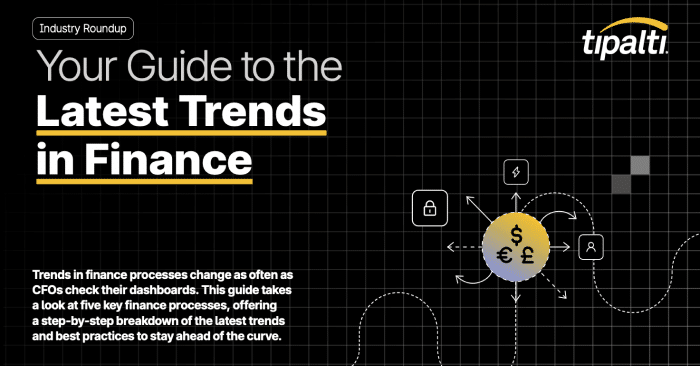
Finance trends shift fast—explore 5 key processes & tips to stay ahead.
Fill out the form to get your free eBook.

Trends in finance processes change as often as CFOs check their dashboards. This guide takes a look at five key finance processes, offering a step-by-step breakdown of the latest trends and best practices to stay ahead of the curve.
Robert Collings qualified as a chartered accountant via the apprenticeship route. After completing his time in practice at UHY Hacker Young, he took on several Head of Finance and CFO positions at high-growth technology companies.
He recently left his role at Packfleet, a tech-enabled courier company, to launch Flexal, an AI-native accounting practice.
Foregoing University to Become a Finance Apprentice
Nick Levine: Somewhat unconventionally, you started your accounting career as a finance apprentice rather than attending university. What led you to this decision?
Robert Collings: I always knew I wanted to start a business, and I’ve never really been interested in the traditional routes. When everyone else talked about going to university, I thought, “What can I do to get work experience faster?” From research, I found that apprenticeship-style schemes can give you the qualifications to become an accountant without needing to go to university. I thought it sounded interesting, as accounting gives you pretty good fundamentals to start a business, and with the apprenticeship scheme, you get paid as well as being trained.
Nick Levine: You had excellent academics at school. Was anyone surprised that you chose not to go to university?
Robert Collings: When I told one teacher that I wanted to be an entrepreneur and build a business, he said that in order to do that and become successful, you need to go to university.
Nick Levine: How did you respond to that?
Robert Collings: It hit me hard, as it was someone with authority telling me that I should go to university; otherwise, my plans wouldn’t work. I wanted to prove them wrong.
Building Experience
Nick Levine: How did your apprenticeship equip you with the tools to build a career in finance, and ultimately to start your own company?
Robert Collings: I trained in a top 20 accounting firm, where I really started to understand how accounting firms operate, how to service clients, and how to complete standard accounting procedures. I also looked after various technology startups there.
Nick Levine: And you left UHY Hacker Young to work in Head of Finance and CFO roles in startups?
Robert Collings: Yes. That’s where I learned how to think about strategy, finops, and data. I did everything from the day-to-day processing of transactions to raising investment, implementing company strategy, and even a liquidation. This allowed me to see financial processes from an accounting firm perspective, and also from a tech startup undergoing very high growth.
Starting Flexal, an AI Native Accounting Firm
Nick Levine: You recently left your last employer, Packfleet, to start Flexal. Can you tell me about your vision for the firm?
Robert Collings: Yes! It’s an AI-native accounting firm. Flexal incorporates AI into workflows right from the start, rather than just layering it on top of existing processes. We’re building our own systems with AI ingrained from the start.
Nick Levine: What do you foresee as being the main benefits from this AI-first approach?
Robert Collings: Building a centralized platform will allow us to pull everything together, use the APIs of existing tools, and create a cleaner and more efficient experience for clients and the wider firm. However, I should stress the importance of the human-led approach, too. Flexal is made up of human accountants supercharged by AI. If we get it right, clients will benefit from a slick experience that they are unlikely to find elsewhere.
Nick Levine: What is the firm’s current client base, and what is your service offering?
Robert Collings: At present, we work with founders of early-stage startups, whether they’ve just raised or are bootstrapping. We deliver strategic advice alongside core accounting services, such as management accounts, statutory accounts, and company filings.
Using Payroll Data to Automate Employee Birthday Greetings
Nick Levine: A big focus in the Next Gen Finance leaders series is on automation in finance. Can you share an example of where you have leveraged the benefits of automation?
Robert Collings: Sure. This example is a bit of a curveball. At Packfleet, it was hard for managers to know when someone’s birthday was, as this information wasn’t readily available from our HR and payroll software. We didn’t make people wish others a happy birthday, but we wanted to make sure managers had the tools available to do so in an easy way.
Nick Levine: So you automated birthday greetings?!
Robert Collings: No! We automated telling the managers about upcoming birthdays to help them out. They would then write their own personal messages. To do this, I pulled all the birthday data via an API and wrote a script that would push notifications into the managers’ Slack channels, so they were made aware when the birthdays of their reports were approaching.
Nick Levine: That’s genius. I see how impactful that can be despite being relatively simple to implement.
If Robert’s journey from finance apprentice to leading Flexal has inspired you, don’t stop here—explore more incredible stories and insights from rising stars in the Next Gen Finance Leaders series.
